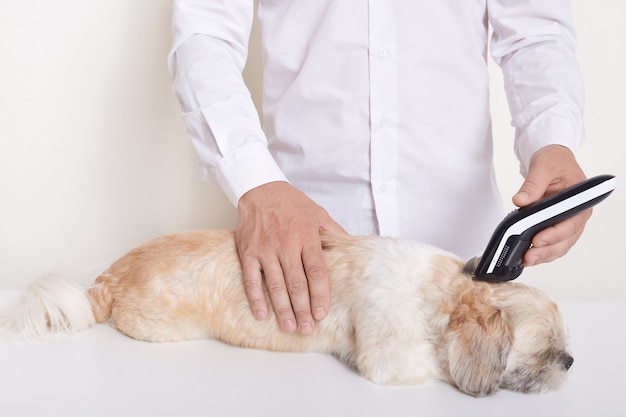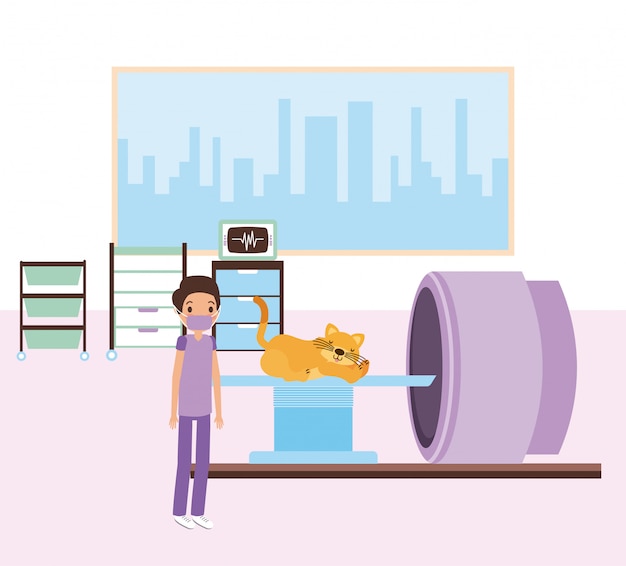When Does Your Pet Need an Ultrasound? Key Symptoms Explained

When Does Your Pet Need an Ultrasound? Key Symptoms Explained
When your pet develops unusual symptoms, it’s understandable to feel both concerned and a little overwhelmed. Pet owners in Downers Grove and surrounding communities often ask, “How do I know if my cat or dog needs an ultrasound?” At 4 Paws Imaging, located at 2581 Ogden Avenue, Downers Grove, IL 60515, we know how important it is to get answers quickly and accurately. Our advanced imaging services, including ultrasounds, X-rays, and CT scans, help uncover the root causes of health issues so your companion can get the right care as soon as possible.
This guide will help you recognize the top pet ultrasound symptoms that may signal the need for diagnostic imaging. We’ll outline the signs to watch for, common reasons your veterinarian may recommend an ultrasound, and what to expect from the imaging process. You’ll also discover how finding a “specialty vet near me” can support your pet’s health journey, especially when your family veterinarian refers you to a local expert. Whether you’re searching for veterinary imaging in Downers Grove or need guidance on when to get pet imaging, our team is here to support you every step of the way.
If you’re concerned about your pet’s health or have questions about our imaging services, you can always reach out to our experienced veterinary professionals. To learn more about the types of ultrasounds we offer, such as abdominal ultrasounds, visit our website for detailed information.
Recognizing the Signs: Does Your Pet Need an Ultrasound?
Understanding when your pet might benefit from an ultrasound comes down to recognizing the subtle or sudden changes in their health. Pet ultrasound symptoms can vary widely, but some of the most common signs that prompt a veterinary referral include unexplained weight loss, persistent vomiting or diarrhea, changes in appetite, and visible abdominal swelling. In other situations, you might notice that your pet is straining to urinate, showing signs of discomfort when lying down, or suddenly becoming lethargic.
For example, a dog who suddenly develops a distended abdomen and appears uncomfortable may need an abdominal ultrasound to rule out conditions such as internal bleeding, organ enlargement, or tumors. Similarly, a cat that stops eating and starts vomiting could be showing early signs of liver or kidney disease, both of which can be visualized with advanced imaging. Other symptoms that may indicate the need for a pet ultrasound include ongoing coughing, difficulty breathing, or changes in heart rhythm, which may point to underlying cardiac issues.
If your family veterinarian observes these symptoms during a routine examination or through lab work, they may recommend a referral to a specialty imaging provider like 4 Paws Imaging. In Downers Grove and the surrounding areas, our veterinary team collaborates closely with referring veterinarians to ensure your pet receives the highest standard of diagnostic care.
Why These Symptoms Occur: Common Causes for Pet Ultrasounds
Many underlying conditions can trigger the symptoms that lead to a pet ultrasound. The reasons for imaging often involve illnesses or injuries that cannot be fully diagnosed through physical exams or basic lab tests alone. Gastrointestinal problems are a frequent cause; pets experiencing chronic vomiting or diarrhea may have underlying issues such as intestinal blockages, inflammatory bowel disease, or masses within the abdomen that require visualization through ultrasound.
Urinary tract concerns are another common reason for imaging. Pets that strain to urinate or have blood in their urine may be suffering from bladder stones, infections, or tumors, all of which can be seen during an abdominal ultrasound. In female pets, reproductive changes such as suspected pregnancy, abnormal discharge, or uterine enlargement often warrant specialized imaging. Our pregnancy ultrasound services offer a non-invasive way to monitor fetal development and diagnose pregnancy complications.
Cardiac symptoms—such as coughing, fainting, or exercise intolerance—can also prompt a referral for an echocardiogram ultrasound. Heart conditions, including congenital defects or acquired diseases, are often invisible without specialized imaging, making ultrasounds and electrocardiograms critical tools for diagnosis.
Other causes for imaging can include unexplained pain, trauma, abnormal bloodwork, or suspected thyroid disorders. When your veterinarian suspects a thyroid condition, we may recommend a thyroid ultrasound to evaluate the structure and function of the gland. Each of these scenarios highlights the importance of advanced diagnostic imaging in Downers Grove for pets who present with concerning symptoms.
Professional Imaging: What to Expect When You Visit a Specialty Vet
Once your family veterinarian determines that your pet needs advanced imaging, they’ll refer you to a specialty imaging provider like 4 Paws Imaging. Our veterinary professionals use state-of-the-art equipment and gentle handling techniques to ensure your pet’s comfort throughout the process.
During your pet’s visit, we will perform the recommended imaging study based on your veterinarian’s referral. For abdominal ultrasounds, your pet may need to fast for several hours before the procedure, allowing for clearer visualization of internal organs. The procedure itself is non-invasive and typically does not require sedation, although anxious pets may occasionally benefit from mild calming medications to reduce stress.
If your pet requires a heart evaluation, our echocardiogram services provide detailed images of heart structures and function, which are then interpreted by a Board Certified Cardiologist. For pets with suspected thyroid issues, our thyroid ultrasounds deliver high-resolution images to aid in diagnosis. In cases where continuous heart monitoring is needed, such as detecting intermittent arrhythmias, we may recommend advanced technologies like Holter monitors, all part of our comprehensive imaging capabilities.
Throughout the imaging process, our veterinary team keeps you informed and works closely with your family veterinarian to ensure seamless communication. Results are typically discussed with your primary care provider, who will then guide you on the next steps for your pet’s treatment plan.
Supporting Your Pet at Home: Prevention and Monitoring
While not all conditions requiring an ultrasound can be prevented, there are steps you can take to support your pet’s ongoing health. Regular veterinary checkups are essential for early detection of changes that may not be obvious at home. Monitoring your pet for subtle shifts in behavior, appetite, or energy level can also help catch health issues early.
Maintaining a consistent feeding schedule, providing high-quality nutrition, and ensuring your pet gets regular exercise are foundational steps for wellness. For pets with chronic health conditions, such as diabetes or heart disease, following your veterinarian’s treatment recommendations and monitoring for new symptoms is especially important. If your pet has a history of thyroid issues or reproductive changes, your family veterinarian may recommend periodic imaging as part of ongoing care.
It is always a good idea to keep detailed notes on any changes in your pet’s routine, appetite, or attitude. This information can be invaluable for your veterinarian when deciding whether a referral for veterinary diagnostics in Downers Grove is appropriate. Additionally, understanding your pet’s normal patterns makes it easier to recognize when something is off.
When to Seek Veterinary Imaging: Getting Timely Answers for Your Pet
Knowing when to get pet imaging is crucial for your pet’s wellbeing. If your pet displays persistent or severe symptoms such as repeated vomiting, noticeable abdominal swelling, sudden collapse, unexplained pain, or difficulty breathing, it is important to contact your family veterinarian right away. In many cases, your primary care vet will refer you to a specialty imaging provider for further diagnostics. For pet owners searching for a “specialist vet near me,” 4 Paws Imaging is your local resource for advanced imaging services and accurate answers.
Prompt imaging can make a significant difference in diagnosis and treatment outcomes, especially for conditions that progress rapidly. For example, abdominal tumors, heart disease, or organ dysfunction can worsen without timely intervention. If your veterinarian recommends a referral, rest assured that our team of veterinary imaging professionals in Downers Grove is prepared to provide the expertise and technology needed for a clear diagnosis.
Always remember that only a veterinary professional can determine whether an ultrasound is needed based on your pet’s unique health profile. Never delay seeking veterinary care if your pet’s symptoms worsen or if you are unsure about the urgency of their condition.
Compassionate Care and Expert Imaging: Next Steps for Your Pet
Navigating your pet’s health concerns can be stressful, but you do not have to face it alone. The experienced veterinary professionals at 4 Paws Imaging are here to support you with advanced imaging services in Downers Grove and surrounding communities. If your family veterinarian has recommended a diagnostic ultrasound, or if you have questions about pet ultrasound symptoms, we encourage you to reach out for guidance and peace of mind.
For those searching for a “specialty veterinarian near me,” our team is dedicated to delivering the highest standard of care in a comfortable, low-stress environment. To learn more about the full range of veterinary imaging services in Downers Grove, explore our service offerings. Whether your pet needs an abdominal ultrasound, a heart evaluation, or a thyroid scan, we are here to help.
If you are ready to schedule an appointment or want to discuss your pet’s symptoms, contact us at (630) 746-1382. You can also visit 2581 Ogden Avenue, Downers Grove, IL 60515 for directions and more information. At 4 Paws Imaging, your pet’s health and comfort are always our top priorities.
Disclaimer: This blog is intended for informational purposes only and should not be considered a substitute for professional veterinary advice. Always consult your veterinarian or a veterinary specialist if you have concerns about your pet’s health or symptoms.
















